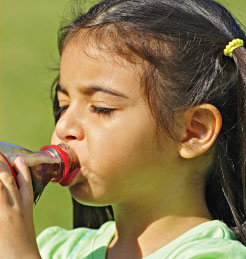Dental Erosion
Dissolving tooth surface enamel with your favorite cola, soda or sport drink
Dear Doctor,
In reading Dear Doctor magazine I have seen several references to dental erosion from sodas and the like. Can you tell me what dental erosion is and what I can do to prevent it in my kids? Do you have any advice on what to substitute that's not harmful to their teeth and health?

Dear Julie,
Thank you for your question as dental erosion is becoming an important topic in dentistry. We are certainly beginning to see more of it and it is a real problem.
Dental erosion is the dissolving of the surface enamel of teeth by acids found in popular soft drinks, carbonated cola beverages, natural fruit juices as well as sports and high energy drinks. Have you ever noticed right after drinking something acidic or sucking a lemon that your teeth feel almost gritty? — That is probably erosion at work.
The chemical erosion that we're talking about is not like tooth decay (cavities). It is actually the direct effect of acids, usually from beverages and some foods, attacking the outer enamel tooth surface. It is unlike tooth decay in which acid is produced by bacteria present in dental plaque attacking specific sites of teeth. Another difference is that although brushing after meals may be beneficial in helping to prevent tooth decay, in cases of enamel loss by erosion tooth brushing may actually make it worse and in fact accelerate it. This happens after excessive consumption of acidic foods and/or beverages, when the tooth surface actually becomes microscopically “softened”; brushing may completely remove this affected tooth layer. In this case, waiting 30 to 60 minutes before brushing will allow time for acid neutralization and tooth re-mineralization by saliva (calcium particles re-harden the tooth surface).
Milk and water are great alternatives to colas and sports drinks. Milk provides calcium to help remineralize teeth.
Once lost, this surface layer cannot be naturally recovered. Therefore, dental erosion can cause continuous and irreversible tooth surface loss, which can be detrimental in the long-term, affecting the form (shape), function and esthetics of the teeth. In more aggressive cases, for example in bulimia (a psychological condition in which acid from vomiting erodes the teeth) it develops even more quickly and may even be associated with tooth pain.
Two chemical properties of beverages have been used to define their erosive potential. First, the acidity of the beverages, measured in something scientists call “pH” values — the lower the pH the more acid it is and second is its “buffering” capacity — a measure of its resistance to neutralization by saliva — the natural defense against acids in the mouth. The greater the buffering capacity of the beverage the longer it takes for the saliva to neutralize it. Carbonated cola beverages, sports and high-energy drinks as well as natural fruit juices have been reported to have a low pH and a high buffering capacity. Other factors involved include the type, concentration, and amount of acid; exposure frequency; duration of the exposure and temperature.
Since consumption of these soft drinks includes younger age groups, attention has been focused on the susceptibility of primary and permanent teeth to erosion by the use of soft drinks. Teeth in children and teenagers may be more easily eroded by acids since they haven't had extensive exposure to fluorides, which makes the enamel harder and more resistant to acid dissolution.
Some advice — try to stop drinking these types of acidic beverages, even fruit juices are related to the development of dental erosion. Try nature's own — water! Milk is also a good alternative however asking a kid to replace colas and sports drinks with milk may not be very realistic. In fact, there are studies showing that in many cases milk has been replaced by soft drinks, but it's definitely worth a try. If this is not realistic, try to reduce the frequency of ingestion of acidic beverages by confining them to mealtimes. Definitely don't sip on them all day long. It takes the saliva 30 minutes to an hour to neutralize their effects — so one acidic drink per hour and the surfaces of your teeth are continually bathed in acid.
Acidic beverages enriched with calcium are also good alternatives. Due to nutritional concerns, calcium has been added to some soft-drinks and natural juices. Research studies have shown that the presence of calcium can reduce the erosive potential of these types of soft drinks. Finally, avoid swishing these drinks in the mouth before swallowing, this maximizes erosion. Try to sip on drinks through straws instead to reduce the contact between these acidic beverages and your teeth.

